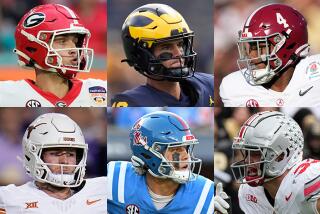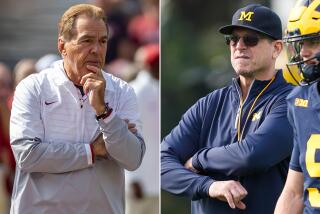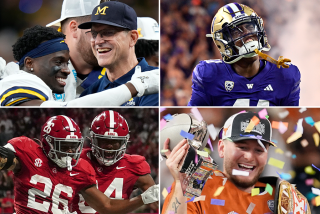Oklahoma, Miami Lead BCS Standings
- Share via
The season’s first release of the bowl championship series standings, that roulette-wheel-like ratings system that has bungled college football’s last two national championship games, provided another shock Monday.
This time, however, the surprise is that the BCS standings are in almost ironclad agreement with conventional wisdom -- at least for one week.
You could quibble over the BCS’ batting order, but the top two teams are Oklahoma and Miami, generally conceded as the nation’s best football-playing schools.
Oklahoma, lifted by consecutive victories over Texas and Iowa State, debuted at No. 1 in the BCS rankings with a point total of 3.92, comfortably ahead of No. 2 Miami at 6.61.
Although Miami is firmly entrenched at No. 1 in both national polls, with Oklahoma at No. 2, it only matters in the BCS that you finish first or second.
At season’s end, the two schools with the lowest point totals will play for the national title in the Fiesta Bowl on Jan. 3.
Rounding out the BCS’ top 10 are Notre Dame at No. 3, followed by Virginia Tech, Georgia, Ohio State, Washington State, Michigan, Louisiana State and Texas.
USC debuts at No. 14, one position ahead of the Trojans’ opponent this week, Oregon.
The BCS system was implemented in 1998 as a way to better determine the national title game participants in a sport that does not have a playoff system.
There are four components in the formula: average of the two national polls, strength of schedule, losses and computer-rating average.
The last two seasons, though, the final BCS standings produced outrage.
In 2000, Oklahoma and Miami were the top schools in both national polls but Florida State, which had lost to Miami, got to play Oklahoma in the Orange Bowl because it finished second in the BCS ratings.
Last year, Miami and Oregon were 1-2 in both polls, yet Nebraska ended up second in the BCS.
And, if recent history is any indication, this week’s moment of BCS bliss may not last.
The problem is, the top six schools in the BCS standings are undefeated and only two of those, Miami and Virginia Tech, play each other.
If five of the top six teams win the rest of their games, all could make a legitimate claim to a berth in the Fiesta Bowl.
“There’s seven weeks to go, there’s so many games left to be played,” Big East Commissioner Michael Tranghese, this year’s BCS coordinator, said Monday. “But, right now, I didn’t think at this stage of the season that the top six teams in the BCS poll would be undefeated, but they are.”
That could spell more trouble for a 5-year-old system that has been picked apart like a Thanksgiving turkey.
“If there’s more than two teams undefeated at the end of the year, there will be much yelling and screaming and controversy,” Tranghese said.
“The only thing is, the system, through its process, will select the two teams that will get a chance to play for it.”
But alas, we might not even have to wait that long for the BCS’ first major dispute.
Should Notre Dame, third in the BCS standings, defeat Florida State on Saturday in Tallahassee, the Irish could jump Miami for the coveted No. 2 spot.
Miami leads Notre Dame by only 1.34 points. A win over Florida State would, at the least, improve Notre Dame’s current No. 6 poll average.
“It would bump them up in the polls, obviously,” Tranghese acknowledged. “It would be close.”
You could not imagine the indignation in Coral Gables if the Irish overtook Miami, which has been No. 1 in the Associated Press poll for a record 20 consecutive weeks.
Tranghese can only hope these potential thorny scenarios play themselves out and the season ends peacefully, but the BCS has been hit and miss on consensus building.
The BCS standings got off to a strong start the first two years by pairing the right two teams for the national title. There wasn’t much argument over Tennessee-Florida State in 1998 or Virginia Tech-Florida State in 1999.
But major problems in 2000 and 2001 have revived calls in many quarters for a college playoff system. That can’t happen until 2006 at the earliest, when the BCS contract expires, and it may not happen then.
“Playoff proponents are going to argue playoff whether we have two undefeated teams or one undefeated team or no undefeated teams, and I understand that,” Tranghese said.
“But, that’s an argument for another day. The BCS is here, and it’s going to be here for four more years. I don’t hear [university] presidents yelling and screaming for a playoff.”
More to Read
Go beyond the scoreboard
Get the latest on L.A.'s teams in the daily Sports Report newsletter.
You may occasionally receive promotional content from the Los Angeles Times.











